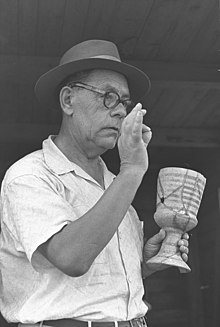Eleazar Sukenik
| Eleazar Sukenik | |
|---|---|

Eleazar Sukenik, 1951
|
|
| Born |
12 August 1889 Białystok |
| Died | 28 February 1953 (aged 63) Jerusalem |
| Nationality | Israel |
| Fields | archaeology |
| Institutions | Hebrew University in Jerusalem |
Eleazar Lipa Sukenik (12 August 1889, Białystok – 28 February 1953, Jerusalem) was an Israeli archaeologist and professor at the Hebrew University of Jerusalem. In Israel his first name is popularly known as "Eliezer".
Having arrived in Palestine in 1911 he worked as a school teacher and tour guide. He participated in the "War of the Languages" that erupted among Zionist activists in Palestine in 1913.
He served in the British army in World War I in the 40th Battalion of the Royal Fusiliers which became known as the Jewish Legion.
In addition to his important excavations in Jerusalem (including the "Third Wall" and numerous ossuary tombs) he played a central role in the establishment of the Department of Archaeology of the Hebrew University. He recognized the importance of the Dead Sea Scrolls to Israel and worked for the Israeli state to buy them. In 1948, he published an article tentatively linking the scrolls and their content to a community of Essenes, which became the standard interpretation of the origin of the scrolls, a theory that is still probably the consensus among scholars, but has also been widely questioned. In 1950, he received the Solomon Bublick Award of the Hebrew University of Jerusalem for this work.
He was the father of soldier, politician and archaeologist Yigael Yadin, the actor Yossi Yadin (born Joseph Sukenik, 1920-2001), and Mati Sukenik, one of the first pilots of the Israeli Air Force, who was killed in action during the 1948 Arab-Israeli War.
...
Wikipedia
